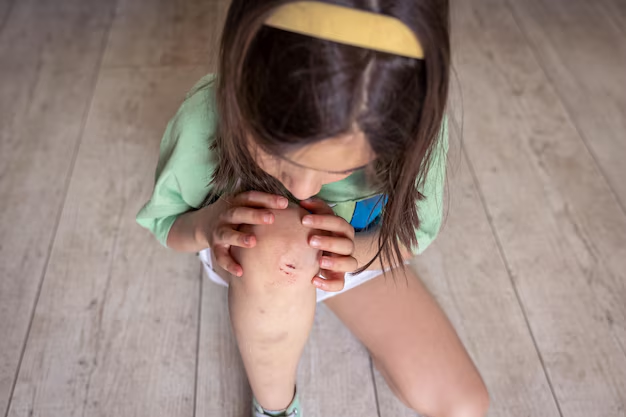Eczema: Will It Ever Go Away?
For millions worldwide, eczema is more than just an itch — it's a persistent reminder of the struggle with skin that refuses to cooperate. Whether you're battling it personally or caring for a loved one, the question looms large: Will eczema ever go away? Let's delve into this prevalent skin condition from all angles, exploring its nature, management strategies, and realistic expectations.
Understanding Eczema
What Is Eczema?
Eczema, also known as atopic dermatitis, is a chronic skin condition characterized by red, inflamed, and itchy skin. It's more common in children but can affect individuals at any stage of life. The term "eczema" is often used interchangeably with dermatitis, although it refers specifically to a range of conditions that cause the skin to become red, itchy, and inflamed.
Common Types of Eczema
Before determining if eczema will go away, it's crucial to understand the different types of eczema and how they manifest:
- Atopic Dermatitis: The most common form, it usually begins in childhood.
- Contact Dermatitis: Triggered by an allergen or irritant, leading to a red, itchy rash.
- Dyshidrotic Eczema: Characterized by small blisters on the hands and feet.
- Nummular Eczema: Small, coin-shaped spots of irritation prevalent in adults.
- Seborrheic Dermatitis: Commonly affects the scalp and other oily areas, like eyebrows and nose.
Causes and Triggers
The exact cause of eczema isn't fully understood, but it's believed to be a combination of genetic and environmental factors. Certain triggers can worsen the condition:
- Environmental Allergens: Dust, pollen, or pet dander.
- Irritants: Soaps, detergents, and certain fabrics.
- Weather Conditions: Cold, dry weather can exacerbate symptoms.
- Stress: Emotional stress can trigger or worsen outbreaks.
Understanding what triggers eczema is essential for managing the condition effectively. Identifying and avoiding these triggers can help minimize flare-ups.
Can Eczema Go Away?
The Hope for Childhood Eczema
For parents, the optimistic hint often shared by doctors is that many children "outgrow" eczema. In truth, 60-70% of children with eczema experience significant improvement or remission by the time they reach adolescence. However, this doesn't mean eczema is cured; the symptoms may simply become less severe or frequent.
Eczema in Adults: A Persistent Battle
In adults, eczema tends to be more persistent. While complete remission is less common, it is possible to manage and minimize symptoms by identifying and avoiding triggers and incorporating effective skin-care practices.
Factors Influencing Remission
Several factors influence whether eczema goes away or persists into adulthood:
- Genetics: A strong family history can mean a higher likelihood of chronic issues.
- Immune System: Individuals with immune system issues may find it more challenging to find relief.
Managing Eczema Effectively
Skincare Routine
An effective skincare routine is foundational in managing eczema:
- Moisturizing: Regular and intense hydration can help maintain the skin barrier.
- Gentle Cleansers: Avoid harsh soaps that strip the skin of natural oils.
- Warm Baths: Short, lukewarm baths with bath oil can soothe the skin.
Identifying Triggers
Keeping a diary to record flare-ups and possible triggers can help identify what causes or worsens symptoms. This personal insight can guide lifestyle changes that minimize exposure to these triggers.
Physical and Emotional Self-Care
The relentless itch and appearance can impact more than just the skin — mental and emotional well-being can take a hit:
- Stress Management: Engage in relaxation techniques such as yoga or meditation.
- Support Networks: Connect with others who understand the struggle.
Professional Help
Regular consultations with a dermatologist or healthcare provider can guide you in establishing a personalized eczema management plan. Although this isn't a cure, professional guidance can help in managing symptoms effectively.
Hope on the Horizon: New Treatments and Research
Emerging Therapies
Researchers are constantly developing new treatments and therapies aimed at providing relief:
- Biologics: Targeted therapies that work on the immune system to reduce symptoms.
- Topical Treatments: Advancements in creams and ointments designed to treat inflammation.
Lifestyle Modifications
- Diet and Nutrition: Some evidence suggests that changes in diet can impact eczema symptoms. Foods with anti-inflammatory properties may help.
- Humidity Control: Using humidifiers can prevent skin from drying out during winter months.
Global Research Initiatives
Ongoing research offers hope, with scientists exploring potential genetic therapies and more personalized medicine approaches that could significantly alter the eczema landscape.
Living Well With Eczema
Having eczema can be frustrating and exhausting, but it's essential to remember that you're not alone. Advancements in treatment and research offer hope and practical solutions. Understanding your unique triggers and maintaining a strong skincare routine can empower you to manage symptoms more effectively.
Encouragement and Empowerment
Being proactive, informed, and engaging with healthcare providers can enhance your ability to manage eczema effectively. Always remember, while eczema can be a lifelong companion, managing it effectively makes life not just bearable but enjoyable.
Summary: Key Takeaways on Eczema Management
- 🧴 Skincare Routine: Consistent moisturization is key.
- 🔍 Trigger Identification: Keeping a trigger diary can help avoid flare-ups.
- 🤝 Seek Support: Connecting with others can provide emotional strength.
- 🌿 Emerging Therapies: Stay informed about new treatments and research.
- ❄️ Environmental Control: Use humidifiers to maintain skin moisture.
- 👨⚕️ Professional Guidance: Regularly consult with healthcare providers.

